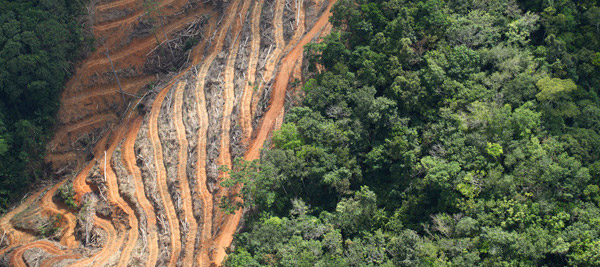A new study published in Global Environmental Change added up all the world’s ecosystem services – from carbon storage and crop pollination, to recreation and flood mitigation – and found, every year, nature provides $145 trillion in benefits. It also indicates that land use changes, most of which has been caused by humans, may be reducing these benefits by trillions of dollars every year.
To put this into perspective, the cumulative gross domestic product (GDP) of all nations as calculated by the World Bank was $97 trillion in 2012, with the U.S. topping the list at $16 trillion.

Tropical forests provide many important ecosystem services such as carbon sequestration and temperature regulation, which scientists estimate contribute to a total worth of $5,280 per hectare per year. Yet, every day, 50,000 hectares are lost to deforestation. Photo by Rhett A. Butler.
The study was compiled by a team of scientists from various universities around the world. They estimated the value of the world’s ecosystem services by assessing both their direct and indirect benefits to human welfare.
“Nature is not just a pretty place,” lead author Robert Costanza, from The Australian National University’s Crawford School of Public Policy, told Business Insider Australia. “Nature is a large and important part of the real economy which adds to human well-being.”
The team specifically looked at 10 biomes, including coral reefs, tropical forests, grasslands, and both inland and coastal wetlands. They compared data collected over 15 years, and found that land use changes have caused big shifts in many biomes and, consequently, their value to humans. Marine ecosystems showed the biggest reductions in value, which the authors attribute largely to losses of coral reefs. Terrestrial ecosystems such as tropical forests and wetlands also showed significant reductions, due primarily to deforestation and draining.
“Our estimates show that global land use changes between 1997 and 2011 have resulted in a loss of ecosystem services of between $4.3 and $20.2 trillion [per year], and we believe that these estimates are conservative,” the study states.
In other words, the world may be losing its ecosystems services at a rate greater than the annual GDP of any single country.

Wetlands are extremely important for hydrological services such as flood control. Coastal wetlands, also called estuaries, are also nurseries upon which many species of ocean fish depend. The combined estimated total value of coastal and inland wetlands amounts to $219,527 per hectare per year.
Tropical forests provide important climate stabilization services such as carbon sequestration, precipitation regulation, and temperature regulation. However, upwards of 50,000 hectares of tropical forests disappear every day as human developments expand.
Wetlands play an important role in water purification, flood control, and shoreline stabilization. Yet, by 1993, scientists estimate that half of the world’s wetlands had been drained, primarily for agricultural purposes.
The study underlines the importance of increasing awareness of the value of nature in order to preserve it, and suggests that determining its monetary value could help catalyze conservation policies.
“It allows us to build a more comprehensive and balanced picture of the assets that support human well-being and [humanity’s] interdependence with the well-being of all life on the planet,” the authors write.
Citations:
- Costanza, R., de Groot, R., Sutton, P., van der Ploeg, S., Anderson, S. J., Kubiszewski, I., … & Turner, R. K. (2014). Changes in the global value of ecosystem services. Global Environmental Change, 26, 152-158.
Related articles
Next big idea in forest conservation? Making community protection economically viable
(05/29/2014) After years of discovering new species and setting up protected areas, Neil Burgesses’ career changed. Currently he is focused on community-driven conservation and on how to improve protected areas in Africa’s Eastern Arc mountains region. Neil Burgess has worked in the conservation field for over twenty years, mainly in Tanzania where he also lived for five years.
Chile turns to owls to combat fatal disease

(04/01/2014) This year the Hanta virus has already caused 15 deaths in Chile, according to reports in The Santiago Times. It isn’t always fatal—the 15 deaths were of a total of 36 cases over six months—but the symptoms are severe. Those affected experience flu-like symptoms, as well as nausea, vomiting, diarrhoea and trouble breathing. But now Chile is using a novel method to fight the disease: owls.
Next big idea in forest conservation? Quantifying the cost of forest degradation

(03/27/2014) How much is a forest really worth? And what is the cost of forest degradation? These values are difficult to estimate, but according to Dr. Phillip Fearnside, we need to do a better job. For nearly forty years, Fearnside has lived in Amazonia doing ecological research, looking at the value of forests in terms of environmental or ecosystem services such as carbon storage, water cycling, and biodiversity preservation. Fearnside then works to convert these services into a basis for sustainable development for rural populations.
Deforestation makes Indonesia hotter, reduces quality of life

(03/26/2014) One of the reasons I like living in the tropics is that they are perpetually warm. A pair of shorts and a light shirt will comfortably get you through the day and night in most parts of Indonesia. Still there are the occasional unpleasant extremes. Even the most cold-blooded creature will likely break into a sweat walking for more than a few minutes in the sun filtering through Jakarta’s polluted skies. We consider such heat a normal part of the tropics. But is it really?
Ecotourism pays: study finds lower poverty where nature-based tourism is prevalent

(02/25/2014) A new study has quantified a point long advocated by advocates of setting aside protected areas: ecotourism pays. The research, published in Proceedings of the National Academy of Sciences (PNAS), finds that communities neighboring conservation areas in Costa Rica had lower rates of poverty relative to other areas.